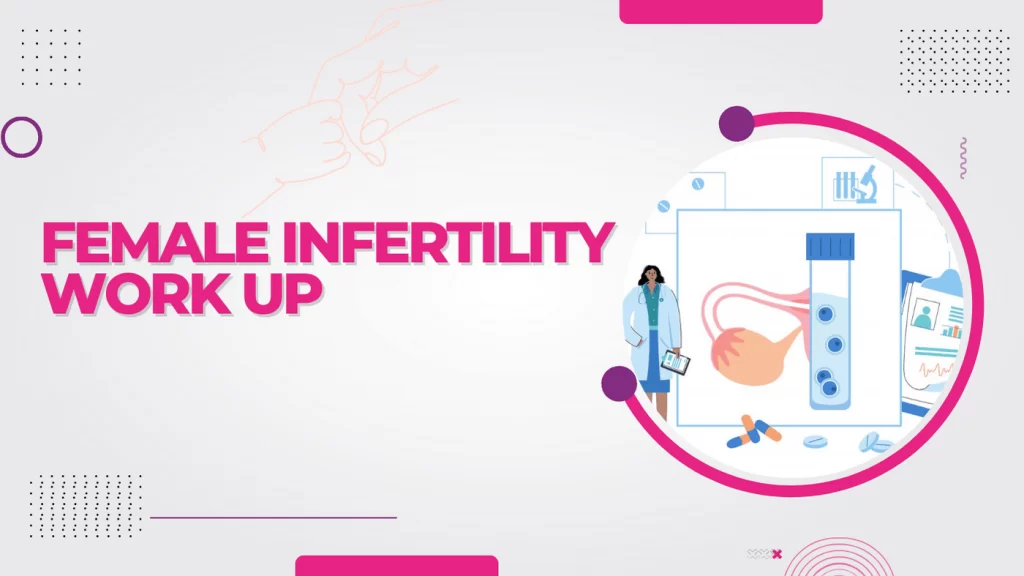
Fertility tests are conducted if you are not able to conceive at the end of one year of unprotected sex if you are younger than 35 years. Tests can be conducted earlier if your age is more than 35, or if you are having known fertility related issues like PCOS, endometriosis, ovulation disorders, previous surgeries on reproductive organs etc.
A Clinician will obtain your medical, obstetric, menstrual history which will help to suspect certain disorders and also helps to decide what workup has to be carried out to you based on your past history. Physical examination includes BMI, BP, systemic examination of cardia, respiratory system, examination of thyoid gland, breasts, genitals is also done to look into factors affecting fertility. Some of the tests done as a part of work up are explained below which are aimed at determining your ovulation, tubal status, uterine factors and other pelvic factors which affect your fertility.
Fertility Tests
Day 2/3 blood tests
- E2 (estrogen): the main female reproductive hormone secreted from the ovary
- FSH (follicle-stimulating hormone): releases from the brain and stimulates the ovary to mature an egg. High FSH levels can indicate to your physician that the hypothalamus and pituitary glands are working harder than normal due to a decrease in ovarian reserve (egg supply). FSH levels can vary from cycle to cycle.
- AMH (anti-Müllerian hormone): AMH is the most accurate predictor of a woman’s egg supply. This test can be more accurate than FSH because there is no fluctuation from month to month and the test is not dependent on a woman’s menstrual cycle, which means women can have the test at any point.
- LH (luteinizing hormone): a hormone that is integral to the final maturation and release of a mature follicle.
Internal Baseline Ultrasound
A sonographer or physician will perform an ultrasound of the ovaries between days 2 through 4 of your cycle. This determines the antral follicle count (AFC), which represents the number of eggs available for pregnancy that month, ovarian volume, ovarian cysts, follicular tracking. Ultrasound also helps to diagnose uterine abnormalities like fibroids , adenomyosis, uterine anomalies. It can also detect some tubal problems like hydrosalpinx. It is used to assess endometrial thickness and vascularity which is crucial for implantation.
HSG
The HSG, or hysterosalpingogram, is an x-ray of the uterus and fallopian tubes to help determine their condition. Physicians rely on this test to see if a patient’s fallopian tubes are open, to assess whether the uterus has normal shape, and to ensure that the cavity is not affected by fibroids polyps, or scar tissue
Infectious Disease Testing
Hepatitis B surface antigen; Hepatitis C antibody; HIV; RPR (serology); Rubella titer (one time only); blood group; and RH (one time only). Negative infectious disease results must be documented every 12 months.
Hormonal tests and other blood tests:
Like TSH, FT4, Prolactin, blood sugars, HBAIC are done to look for abnormalities as they are crucial for healthy pregnancy. Additional tests like lipid profile, liver and kidney function tests, blood counts can be done for the purpose of safety depending upon the history of patient.
Other Tests Offered Under Special Circumstances:
Hystero-Laparoscopy for Evaluating uterine and pelvic cavity
If there is suspicion of pelvic conditions based on clinical history, an abnormal pelvic exam, or abnormalities identified through less invasive testing, a diagnostic laparoscopy is done. During hysterolaparoscopy, if needed operative treatment can be done like tubal cannulation, fibroid removal, ovarian cyst excision.
Blood Clotting Evaluation (Thrombophilia tests) / Immunological tests
This test is offered in case of recurrent implantation failure, recurrent abortions or history of bleeding or clotting disorders. Tests in this panel are APLA profile, ANA, protein C and S deficiency, antithrombin III, Factor V leiden, homocysteine etc
Endometrial Biopsy
This is done to in case of suspicion of genital tuberculosis, endometrial hyperplasias. In both the circumstances, there can be infertility. Other rare investigations include uterine NK cells, endometrial receptivity analysis which are done on endometrial biopsy in cases of unexplained IVF failures.
Genetic screening:
Karyptyping and chromosomal microarray is offered in case of recurrent implantation failure and recurrent abortions .
FAQs